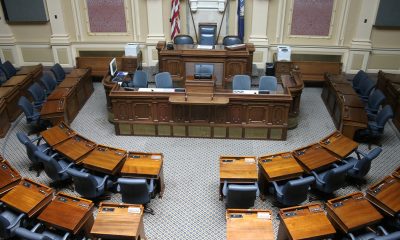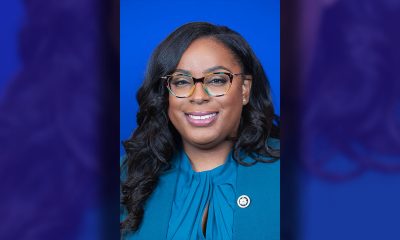Business
New Jersey, Leagues Renew Court Tussle Over Sports Gambling

New Jersey Gov. Chris Christie speaks during a news conference Thursday, Jan. 9, 2014, at the Statehouse in Trenton, N.J. A day after revelations that Christie’s administration may have closed highway lanes to exact political retribution, the prospective Republican presidential candidate is faced with what may be the biggest test in his political career. (AP Photo/Mel Evans)
DAVID PORTER, Associated Press
PHILADELPHIA (AP) — The fight over legalized sports gambling in New Jersey returned to a federal appeals court Tuesday, where attorneys for the state and the country’s major sports leagues spent nearly an hour parsing language in a decades-old federal statute and in recent court rulings.
At issue: Whether a 2014 New Jersey law repealing prohibitions against sports gambling violates the 1992 federal Professional and Amateur Sports Protection Act, which says states cannot “sponsor, operate, advertise, promote, license or authorize” sports betting.
A good portion of Tuesday’s oral arguments before the 3rd U.S. Circuit Court of Appeals focused on the meaning of the word “authorize,” and whether New Jersey did that when Gov. Chris Christie signed the law striking the betting prohibitions.
Attorneys from both sides endured sharp questioning from the court, which heard a previous incarnation of the case in 2013. In the ruling that followed that argument, the court said New Jersey couldn’t be prevented from repealing its sports gambling laws. The state seized on that language to write its 2014 law.
New Jersey is hoping sports gambling will reap tens of millions of dollars in revenue and help turn around the flagging fortunes of its casino and horse racing industries. The leagues have said expanding sports gambling will threaten the integrity of their games and lead to increased incidences of game-fixing.
Paul Clement, an attorney representing the NFL, NBA, NHL, Major League Baseball and the NCAA, said New Jersey wasn’t just repealing laws against sports gambling. He said the state would restrict sports betting to heavily regulated casinos and racetracks, limit bets to people over 21 and bar bets on in-state teams.
“A partial repeal that selects the favored venues and dictates who’s going to engage in sports gambling and on what games they’re going to bet on” amounts to state authorization, Clement said.
Arguing for New Jersey, Theodore Olson called it “Orwellian” that New Jersey would purportedly be in violation of federal law by allowing sports gambling in certain areas but would be OK if it allowed it everywhere. Besides, he added, “everything in New Jersey is regulated,” from muffler shops to beauty salons.
Ronald Riccio, a lawyer representing the New Jersey Thoroughbred Horsemen’s Association, told the judges that Monmouth Park, the only venue in the state to prepare to begin offering sports betting, would have its betting solely regulated by an independent group.
“It will also be under all state and federal consumer protection laws,” he said. “The only thing regulated is sports betting itself. The regulation is entirely up to the private sector as it sees fit.”
Though no casinos have committed to offering sports gambling while the case goes through the courts, the leagues contend that allowing sports gambling there amounts to the state playing a regulatory role because the casinos are state-licensed.
Judge Julio Fuentes queried Peter Phipps, a Department of Justice lawyer appearing in support of the leagues, on whether a sports betting operation would be functioning under a casino’s license if it hadn’t had to apply or pay a fee.
The judge likened it to driving a car with someone else’s license. “Isn’t a casino license not transferable? I can’t imagine it would cover somebody else’s sports betting operation,” Fuentes said.
The case dates back to 2012 when the leagues and NCAA sued the state to stop its initial sports gambling law from being implemented. The state has suffered court defeats since then and failed in an attempt to have the U.S. Supreme Court hear its constitutional challenge last year.
Attorneys on Tuesday acknowledged that the 2014 sports gambling law was worded explicitly to follow the 3rd Circuit’s 2013 ruling.
In recent months, NBA Commissioner Adam Silver and Major League Baseball Commissioner Rob Manfred have separately expressed some level of support for taking a new look at legalized sports betting outside Nevada, the only state to allow betting on individual games at betting parlors.
Copyright 2015 The Associated Press. All rights reserved. This material may not be published, broadcast, rewritten or redistributed.
Activism
OP-ED: AB 1349 Puts Corporate Power Over Community
Since Ticketmaster and Live Nation merged in 2010, ticket prices have jumped more than 150 percent. Activities that once fit a family’s budget now take significant disposable income that most working families simply don’t have. The problem is compounded by a system that has tilted access toward the wealthy and white-collar workers. If you have a fancy credit card, you get “presale access,” and if you work in an office instead of a warehouse, you might be able to wait in an online queue to buy a ticket. Access now means privilege.

By Bishop Joseph Simmons, Senior Pastor, Greater St. Paul Baptist Church, Oakland
As a pastor, I believe in the power that a sense of community can have on improving people’s lives. Live events are one of the few places where people from different backgrounds and ages can share the same space and experience – where construction workers sit next to lawyers at a concert, and teenagers enjoy a basketball game with their grandparents. Yet, over the past decade, I’ve witnessed these experiences – the concerts, games, and cultural events where we gather – become increasingly unaffordable, and it is a shame.
These moments of connection matter as they form part of the fabric that holds communities together. But that fabric is fraying because of Ticketmaster/Live Nation’s unchecked control over access to live events. Unfortunately, AB 1349 would only further entrench their corporate power over our spaces.
Since Ticketmaster and Live Nation merged in 2010, ticket prices have jumped more than 150 percent. Activities that once fit a family’s budget now take significant disposable income that most working families simply don’t have. The problem is compounded by a system that has tilted access toward the wealthy and white-collar workers. If you have a fancy credit card, you get “presale access,” and if you work in an office instead of a warehouse, you might be able to wait in an online queue to buy a ticket. Access now means privilege.
Power over live events is concentrated in a single corporate entity, and this regime operates without transparency or accountability – much like a dictator. Ticketmaster controls 80 percent of first-sale tickets and nearly a third of resale tickets, but they still want more. More power, more control for Ticketmaster means higher prices and less access for consumers. It’s the agenda they are pushing nationally, with the help of former Trump political operatives, who are quietly trying to undo the antitrust lawsuit launched against Ticketmaster/Live Nation under President Biden’s DOJ.
That’s why I’m deeply concerned about AB 1349 in its current form. Rather than reining in Ticketmaster’s power, the bill risks strengthening it, aligning with Trump. AB 1349 gives Ticketmaster the ability to control a consumer’s ticket forever by granting Ticketmaster’s regime new powers in state law to prevent consumers from reselling or giving away their tickets. It also creates new pathways for Ticketmaster to discriminate and retaliate against consumers who choose to shop around for the best service and fees on resale platforms that aren’t yet controlled by Ticketmaster. These provisions are anti-consumer and anti-democratic.
California has an opportunity to stand with consumers, to demand transparency, and to restore genuine competition in this industry. But that requires legislation developed with input from the community and faith leaders, not proposals backed by the very company causing the harm.
Will our laws reflect fairness, inclusion, and accountability? Or will we let corporate interests tighten their grip on spaces that should belong to everyone? I, for one, support the former and encourage the California Legislature to reject AB 1349 outright or amend it to remove any provisions that expand Ticketmaster’s control. I also urge community members to contact their representatives and advocate for accessible, inclusive live events for all Californians. Let’s work together to ensure these gathering spaces remain open and welcoming to everyone, regardless of income or background.
Activism
Oakland Post: Week of December 31, 2025 – January 6, 2026
The printed Weekly Edition of the Oakland Post: Week of – December 31, 2025 – January 6, 2026

To enlarge your view of this issue, use the slider, magnifying glass icon or full page icon in the lower right corner of the browser window.
Activism
Big God Ministry Gives Away Toys in Marin City
Pastor Hall also gave a message of encouragement to the crowd, thanking Jesus for the “best year of their lives.” He asked each of the children what they wanted to be when they grow up.

By Godfrey Lee
Big God Ministries, pastored by David Hall, gave toys to the children in Marin City on Monday, Dec. 15, on the lawn near the corner of Drake Avenue and Donahue Street.
Pastor Hall also gave a message of encouragement to the crowd, thanking Jesus for the “best year of their lives.” He asked each of the children what they wanted to be when they grew up.
Around 75 parents and children were there to receive the presents, which consisted mainly of Gideon Bibles, Cat in the Hat pillows, Barbie dolls, Tonka trucks, and Lego building sets.
A half dozen volunteers from the Big God Ministry, including Donnie Roary, helped to set up the tables for the toy giveaway. The worship music was sung by Ruby Friedman, Keri Carpenter, and Jake Monaghan, who also played the accordion.
Big God Ministries meets on Sundays at 10 a.m. at the Mill Valley Community Center, 180 Camino Alto, Mill Valley, CA Their phone number is (415) 797-2567.
-

 Activism4 weeks ago
Activism4 weeks agoDesmond Gumbs — Visionary Founder, Mentor, and Builder of Opportunity
-

 Activism4 weeks ago
Activism4 weeks agoFamilies Across the U.S. Are Facing an ‘Affordability Crisis,’ Says United Way Bay Area
-

 Alameda County4 weeks ago
Alameda County4 weeks agoOakland Council Expands Citywide Security Cameras Despite Major Opposition
-

 Alameda County4 weeks ago
Alameda County4 weeks agoBling It On: Holiday Lights Brighten Dark Nights All Around the Bay
-

 Activism4 weeks ago
Activism4 weeks agoBlack Arts Movement Business District Named New Cultural District in California
-

 Activism4 weeks ago
Activism4 weeks agoLu Lu’s House is Not Just Toying Around with the Community
-

 Activism4 weeks ago
Activism4 weeks agoOakland Post: Week of December 17 – 23, 2025
-

 Black History2 weeks ago
Black History2 weeks agoAlfred Cralle: Inventor of the Ice Cream Scoop



















































